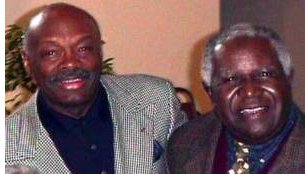

 Thomas Fleming's 90th birthday was celebrated Friday, November 29 with a party in San Francisco attended by several hundred people. Keynote speaker Mayor Willie Brown (l.) saluted Fleming
for his 53 years of writing and community activism at the Sun-Reporter.
Thomas Fleming's 90th birthday was celebrated Friday, November 29 with a party in San Francisco attended by several hundred people. Keynote speaker Mayor Willie Brown (l.) saluted Fleming
for his 53 years of writing and community activism at the Sun-Reporter.
Following is Fleming's 90th Birthday Essay:
A lot of things have changed in San Francisco since I began my career as a journalist for the black press in 1944.About that same year, the big hotels downtown started letting blacks in for the first time. One reason was because some papers were sending black correspondents to the Pacific theater war, and because blacks started coming through the city as captains and majors. The hotels didn't like the negative publicity it generated when they refused accommodations to these men.
The downtown hotels then had no black employees. They did during the early years of this century. But when the hotel workers were unionized in the 1920s and '30s, the black workers were thrown out.
Racial discrimination was very powerful in San Francisco in 1944. A lot of restaurants wouldn't serve black customers -- even the big restaurants in Chinatown. There weren't any black policemen or black firemen in San Francisco at all. There wasn't a single black teacher in the public schools.
San Francisco had four daily newspapers, and Oakland across the bay had two. But none of them hired a black reporter until 1962.
The San Francisco Municipal Railway, which runs the city's transit system, didn't have any black employees until about 1941. During the war, they had to hire blacks because of the shortage of white manpower.
The black population of San Francisco jumped dramatically due to the influx of war workers. When Roger Lapham was mayor of San Francisco (1944-48), I was invited to a press conference he held, and afterwards, he came up and asked me, "Mr. Fleming, how long do you think these colored people are going to be here?"
I looked him in the eye and said, "Mr. Mayor, do you know how permanent the Golden Gate is?" He said yes. I said, "Well, the black population is just as permanent. They're here to stay, and the city fathers may as well make up their minds to find housing and employment for them, because they're not going back down South." He turned red in the face. That was the only exchange of words I ever had with him.
When the Reporter began publication -- it later became the Sun-Reporter -- it was accepted right away by the black community, because the daily press ignored the existence of blacks almost entirely, with the exception of crime stories. I think most black people still depend upon the black papers, particularly for their social events and news about their churches.
In the black press, you read the stories of the lynchings when they happened, the jobs you could get, the instances of discrimination, the hotels you could stay in. You wouldn't see those stories in the daily papers. Without the black press, black people wouldn't have had any kind of voice at all. The black press started as an anti-slavery tool, and it has always led the fight for complete integration. The civil rights movement started with the black press.
One difference with the black press today, compared to the '40s, is that you no longer have national black papers that circulate all over the country. Local black papers are now able to write about events in their own communities better, and get them in the paper quickly. Now they have black news services that can send the news out to the local papers and get it in the next issue.
Also, the black press now gets full-page ads from big corporations, which it didn't before. In the 1940s, they looked upon it as charity. Then they realized that blacks bought in the same quantities as whites. When I look back at how much effect the black press has had in solving racial problems, I can only say that it's made a slight dent, because the problems still exist. You can see that by the adverse attitude about affirmative action, not only in California, but nationwide.
I have no regrets about spending my entire career with the black press. I might have enjoyed it better with the white press, but I had no choice then. At least I tried to get in, but they weren't hiring us.
If a young black journalist asked me today whether he should work for the black press or the mainstream press, I'd tell him to get a job wherever he could, because jobs in the media are very limited now. I don't think it's necessarily an advantage to start out working for the black press.
Today, the daily papers and TV and radio stations have more objective coverage of the black community because of the addition of black editorial staff members. They have stories about black events that at one time got only in the black press. Black reporters might make suggestions about what to cover. Their interest is greater, because their private lives are spent mostly in the black community.
But there's still a need for the black press. If the daily papers covered all the different facets of black society the way they do white society, there wouldn't be a black paper in existence.
As long as there's racism in America, there will be a black press.